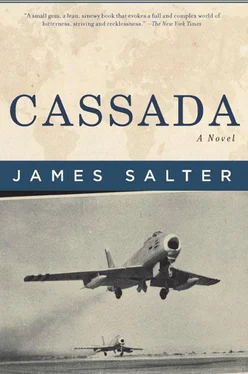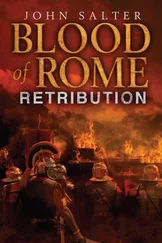“Yeah, I know. You shouldn’t drink the German cognac…”
“Why is that?”
“Stuff’ll kill you.”
“It’s not so bad.” He is beginning to imagine her leaning over and saying something. His heart skips. The man sitting next to her turns to look and after a moment turns away. Frank has his back to them.
“You ought to stick to beer,” Frank says. “They have real good beer down here. It’s only half the price, too.”
“I know.” He feels like a frog with a light shining in his eyes. Perhaps she’s mistaking them for someone else. Finally the man touches her and she turns to him. He puts an arm around her shoulder and says something. She nods. She starts talking to the rest of them, or at least joining in, leaning on her elbows but every so often she looks over.
“The coffee’s not even hot,” Frank says. “What’s the name of this place again?”
“The Ark.”
“Remind me to steer clear of here. What are you looking at all the time?” He turns his head just as they are getting up to leave at the other table. The girl pauses for a second. She’s wearing a black turtleneck sweater. Then she walks out.
“No wonder you didn’t hear half of what I was saying,” Frank says.
“Did you see her? I should have said something to her. I didn’t have the nerve.”
“Finish your drink,” Frank says.
In the vestibule on the way out Frank is struggling with his coat, a big checked coat that makes him look like a German when suddenly the girl comes back in.
“Oh,” she says, “I wanted to ask you something.”
“Me?” Frank says, pointing at himself.
“Me,” Barnes offers.
A slight intake of breath, ja. She nods her head. “You’re not a pilot, are you?”
“Yeah, we are.”
“From Furstenfeldbruck, the airfield?”
“That’s right.”
“Yes. I wondered. I heard planes flying over all day. You’re not from the group up by Trier?”
“The 5th?”
“Yes.”
“No, we’re from France. Chaumont. What’s your name?”
“But perhaps you know something. The other day there was an accident…”
“We heard about it. Two planes. The ops officer of a squadron and another guy.”
“The 44th Squadron,” Frank puts in.
“And were they… they were both killed?”
“Just one.”
“Oh. Which one?”
“The wingman, I think. Why, did you know them?”
“Yes, maybe. Thank you,” she says and quickly goes out.
“Hey, wait a minute!”
She is almost running to a car at the curb. As she gets in, it drives off. The two of them watch it go.
“Barnes, you’re unconscious,” Frank says.
“What do you mean?”
“You’re just unconscious.”
In the car Barnes sits with his legs doubled up in front of him, knees touching the dashboard.
“Who do you suppose she was looking for?”
“What makes you think she was looking for someone?” Frank says, turning the ignition switch. “She was looking for you, you unconscious bastard.”
“No, she knew somebody. I could tell from her eyes.”
“Her eyes? Is that what you noticed?”
They drive past endless blocks of apartments, every window dark. On the hidden streets there are countless others. The city is unknowable. They think they know it, they will always say they do.
“I wonder if I’ll ever see her again. Probably never will.”
“Who knows? With your luck…”
“If I wasn’t expecting to, I might. Isn’t that the way it always is?”
“How would I know?” Frank says.
“She looked Russian or, you know, from somewhere.”
“I don’t think you’ll find any Russians around here.”
“Way back, I mean,” Barnes says.
Grace and his wife left in March, Phipps and Julie a few weeks after. Everyone went down to see them off. It was a regular thing, very much like a funeral except for the champagne. They stood around bundled against the cold, the women gossiping. Finally the train pulled out, everyone waving.
A month later it was the Isbells’ turn. The grey of winter had vanished, the sky was bright. One for the road, they kept saying to him as they poured. Marian was sipping hers, talking and holding her hand over the top of the paper cup whenever someone tried to fill it, turning her head every so often to check on her children.
“Come on, Captain. One for the road.”
“Yeah, one for the railroad.”
Finally all the faces were looking up at them from the platform, faces they knew well and new ones that would slowly take over. So long, see you in the States. Don’t be like everybody else, now; don’t forget to write. A few waves and then the irrevocable, the train began to move. Isbell and his wife were waving. He held a daughter up. Marian lifted the other. They all waved.
The train went along the river, one steep bank of which was in sunshine. They sat watching the vineyards and small towns pass. Isbell felt drowsy. A warm square of sunshine was drifting across his lap. His eyes began to close. A paper cup was rolling around beneath the seat every time the train swayed a little. It hit something, lay still, then rolled back the other way.
His eyes opened sometime later when they began to slow. Coblenz, where they were to change. Marian stood up and began to put coats on the girls as the train rattled over switches. Slowly they came into the station. Marian herded the children down the aisle in front of her.
“How do you feel?” she asked, turning to Isbell.
“Thirsty.”
He followed along, struggling with the bags. The platform was crowded. The car had been hot; it was different outside. The air smelled fresh. Faces bright and smiling. He took some deep breaths. The day felt better.
There was a fifteen-minute wait. Before long the train appeared, a big, blue one, the engine gleaming. The cars floated by. BREMEN EXPRESS, the plaques on them read, KÖLN, DÜSSELDORF, ESSEN, DORTMUND, HANNOVER.
“Here it is, Daddy!” The older girl jumped up and her sister began squealing, too, waving her arms.
“I don’t think this is ours.”
“Here it is!” they cried.
Marian took their hands. “All right,” she said, “ssh. Be still.”
“Isn’t it ours?” they pleaded.
“No, not yet. Are you sure?” she asked Isbell.
“Pretty sure.”
“You could ask somebody.”
The train was still moving past. The Speiswagen eased by, slowing, little chimneys on the roof, white tablecloths within. Part of the crowd moved along as it stopped, flowing to where the doors would be. A good-looking woman in her thirties got on in front of where Isbell was standing. He saw her appear in the corridor and then sit next to the window. His thoughts turned to Munich, the times there.
“Hold your daddy’s hand for a minute,” Marian instructed.
Isbell reached out. A small hand found his. Marian was searching in her handbag for a Kleenex.
“When will ours come, Daddy?” An adoring face was turned up towards his.
“Oh, in a few minutes. Keep your eyes peeled.”
The perfect father, suitcases surrounding him, tickets in his pocket. He glanced towards the window where the woman was sitting, well-groomed and alone, as the car began to move, bearing her off. This time of year in Munich the Isar was racing under the bridges, rushing pale green, bringing the city to life. What did they feel flying down, seeing the last snow of winter in seams along the ground? Then coming in high over the blued city, the countless streets, the anticipation, the joy. They were dancing at the Palast, faces damp and youthful, streets at midnight, Sunday afternoons, the way those times the breath began to pour from her, the first ja. The Express was gliding faster. She was going away. Ja. Ja. Ja!
Читать дальше












